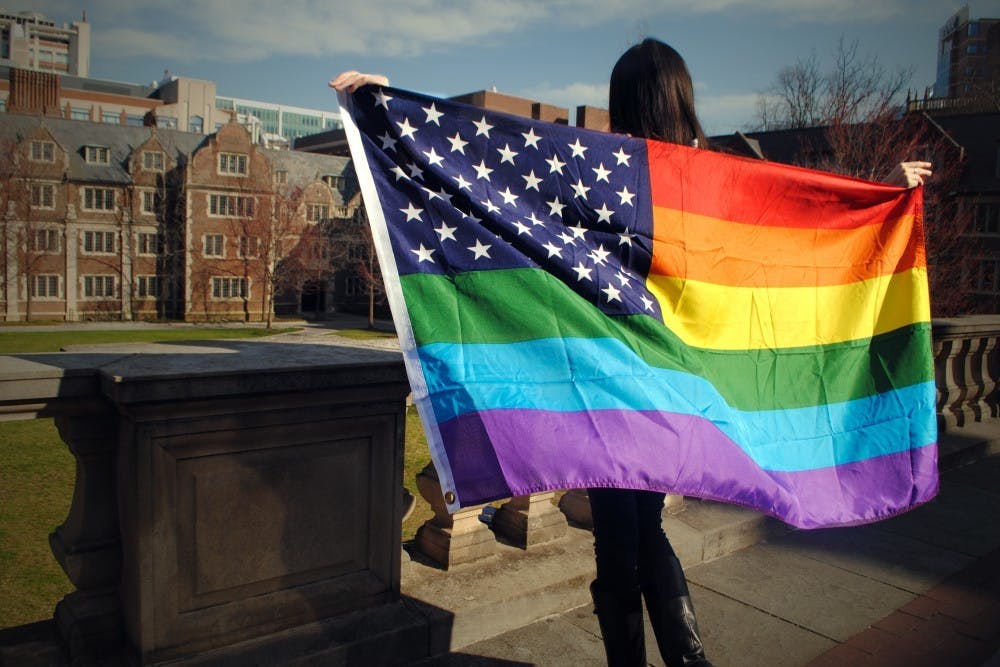
The acceptance of LGBTQ people and identities is one of the biggest debates in many forms of organized religion in the world today. While the issue is widespread and not confined to any one group or country, the handling of LGBTQ issues by Christian churches in America is one of the most prominent and complicated examples. While more Americans support gay marriage than ever before, select Christians and churches have been some of the most vocal critics of LGBTQ rights.
The issue is complicated, because not all Christians view being queer or transgender as sins within their own belief systems. In the past several decades, many popular denominations have begun to ordain LGBTQ clergy, officiate same-sex weddings, and affirm queer and transgender identities. Around two thirds of both Catholic and Protestants in America support same-sex marriage, as do a majority of young Evangelicals.
I was raised Christian in a deeply religious and conservative community, where social justice was often viewed as being at odds with adherence to the faith. When I came to Penn, I saw explicitly inclusive congregations and met accepting faith leaders for the first time, and it made me genuinely optimistic for the future of the Christian church. But there is a massive amount of progress that needs to be made — and recently, some of that progress has been reversed.
At a conference of clergy and members in late February, the United Methodist Church — one of the largest Christian denominations in the United States — rejected a proposed plan that would have given individual churches the option of ordaining LGBTQ clergy and performing same-sex marriages for congregants. Instead, the church decided to affirm and strengthen its existing view that “[t]he practice of homosexuality is incompatible with Christian teaching.”
This news is frustrating and heartbreaking, but it would be naive to call it surprising. Even when individual Christians make a large show of denouncing prejudice and mistreatment directed at LGBTQ people, their public declarations aren’t enough to heal the deep spiritual wounds that churches have historically created. Many Christians I’ve met at Penn support queer and trans rights, but view this support as separate from their faith and sit in quiet discomfort when homophobic, transphobic views are espoused in their own faith communities. In light of the UMC’s vote, it is clear now more than ever that silence isn’t sufficient — all believers, especially young straight and cisgender allies, need to challenge toxic rhetoric and explicitly welcome queer and trans people into their places of worship.

Many horrible things are said and done in the name of Christianity, and while the extreme views might be far removed from mainstream views, they still have significant impact. For example, the Trump administration’s most severe actions against transgender people — like banning transgender service members from the military, and transgender kids from using the right bathrooms at their schools — have stemmed from his ties to the most far-right swaths of Evangelical voters. No faith is a monolith, and Christians with more tolerant views are not responsible for the actions of these groups, but when the consequences of extremism are so visible and normalized, believers who want to differentiate themselves have an opportunity to challenge their fellow Christians (and need to do so before they can bemoan their image problem).
But Christians who think they are practicing a tolerant form of faith still need to examine their beliefs. Too often, what passes for LGBTQ acceptance in Christian communities is sugar-coated bigotry, repacked so that those who espouse it can still take the moral high ground. This is what is going on when people say “hate the sin, love the sinner” and dismiss LGBTQ identity as a valid aspect of personhood. It’s what is at play when Pope Francis says “who am I to judge?” about gay priests but calls gay parents a “threat to the family,” and it’s what underlies ridiculous demands that queer congregants live completely celibate lives when no such demand is made of heterosexuals. Tempered acceptance is not acceptance. Embracing queer and trans people into the faith means embracing them as they are, and changing practice to accommodate them — not making them transform their lives for outdated doctrine.
As a Christian, I love my faith; I think that it can and should provide spiritual fulfillment and healing for anyone who desires it. But before that can be a reality, there are significant barriers that need to be cleared, and Christian faith communities have to put more work into doing so. Hanging a pride flag in the window of your church is great, but creating a truly inclusive faith demands work that is much more intensive, challenging, and potentially uncomfortable. This work will be difficult, but it’s worthwhile and necessary if we want the practice of our faith to live up to its ideals.

ANA WEST is a College sophomore from Spring Lake, Mich. studying English. Her email address is anawest@sas.upenn.edu.
The Daily Pennsylvanian is an independent, student-run newspaper. Please consider making a donation to support the coverage that shapes the University. Your generosity ensures a future of strong journalism at Penn.
Donate







